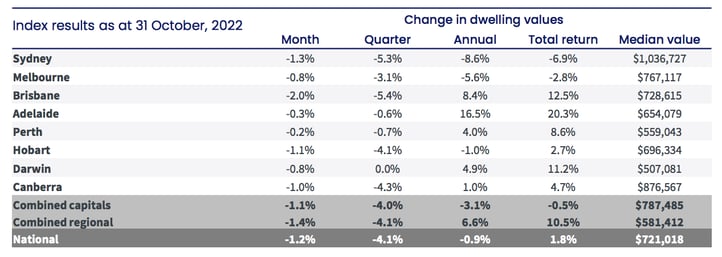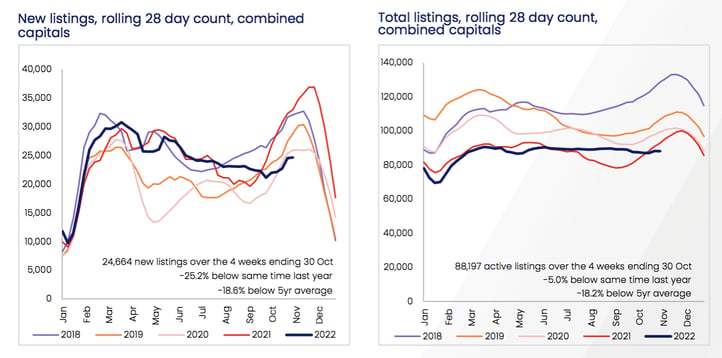The broad-based fall in property prices continued in October with all capital cities seeing values decline.
The latest data from CoreLogic shows that prices dropped 1.2% nationally in October, taking the quarterly decline to 4.1%.
This month, the biggest falls were found in Brisbane, which after a record run during the pandemic, dropped 2% in October, to be down 5.4% over the quarter. Values also declined in Sydney, down 1.3%, Canberra, down 1% and Melbourne 0.8%.
Adelaide, Perth and Darwin have faired slightly better, only declining, 0.3%, 0.2% and 0.8% respectively.

Source: CoreLogic
CoreLogic’s Research Director, Tim Lawless said it is probably still too early to claim the worst of the decline phase is over.
“Despite the easing in the pace of decline, with Australian borrowers facing the double whammy of further interest rate hikes along with persistently high and rising inflation, there is a genuine risk we could see the rate of decline re-accelerate as interest rates rise further and household balance sheets become more thinly stretched,” Mr Lawless said.
Mr Lawless said to date, the housing downturn has remained orderly, at least in the context of the significant upswing in values.
“This is supported by a below-average flow of new listings that is keeping overall inventory levels contained,” he said.
“There’s also tight labour market conditions, an accrual of borrower savings and a larger than normal cohort of fixed interest rate borrowers, who have so far been insulated from the rapid rise in interest rates.”
Despite the recent falls, property values are still above their pre-pandemic levels. At the combined capital city level, housing values have fallen -6.5% following a 25.5% rise through the upswing. Sydney home values are down -10.2% since peaking in January (after a 27.7% rise) and Melbourne values down -6.4% since February (after rising 17.3%).
House values have continued to fall at a faster rate than unit values across most regions. Capital city house values were down -1.2% in October compared with a -0.7% decline in unit values. This underperformance across the lower-density sector has been a feature of the downturn, partially offsetting the substantially larger rise in house values through the growth phase.
Mr Lawless said the smaller decline in values across the unit sector can be attributed to the more affordable price points across the medium to high-density sector.
“The gap between median house and unit values increased to record levels through the COVID upswing,” he said.
“With borrowing capacity being hit hard as interest rates rise, it’s likely more housing demand has been diverted towards more affordable sectors of the market.”
Listings Slowly Rising
New listings slowly increased over October, but the traditional spring selling season remains well below levels at the same time last year and relative to the previous five-year average.
Over the four weeks ending October 30th, the number of newly listed capital city dwellings was tracking -25.2% below a year ago and almost -19% below the previous five-year average. The trend in total advertised listings is holding relatively firm, tracking -5.0% below levels a year ago and -18.2% below the previous five-year average.
“Although we are now seeing a late spring response to freshly advertised supply, every capital city except Darwin is recording a lower than average flow of new listings added to the market over the past four weeks,” Mr Lawless said.
“The low number of freshly advertised properties is probably helping to contain price falls to some extent. So far we haven’t seen any evidence of panicked selling or forced sales.”

Source: CoreLogic
Rental Growth Slowing Down
Meanwhile, rents rose another 0.6% in October led by a 1.1% rise in unit rents while house rents increased by 0.5%.
The speed of rental growth has been slowing, with the rolling quarterly rate of national rental growth dropping from 3.0% over the three months ending May 2022, to 2.1% over the most recent three-month period.
“A gradual slowdown in rental growth in the face of low vacancy rates could be an early sign that renters are reaching an affordability ceiling,” Mr Lawless said.
“Although rents are likely to continue to rise, it’s likely renters will be progressively seeking rental options across the medium to high-density sector, where renting is cheaper, or maximising the number of people in the tenancy in an effort to spread higher rental costs across a larger household.”
Outlook Remains Mixed
According to Mr Lawless, housing values are likely to continue trending lower until interest rates find a ceiling.
Most economists have recently revised their cash rate forecasts upwards due to higher than expected inflation outcomes, with mainstream forecasts for the terminal cash rate ranging from 3.1% to 3.85%, while financial markets are pricing in a peak cash rate closer to 4%.
Although housing risks remain skewed to the downside, there are a few tailwinds that should help to keep this downturn orderly and stave off a material rise in distressed listings, including the tight labour market, immigration increasing and the tight rental market.
Mr Lawless said the silver lining to falling home values is a more affordable entry point to the market for buyers.
“In the most expensive capital city, Sydney, the median house value has fallen by approximately $160,000 since moving through a peak,” he said. “House values in Melbourne are roughly $76,000 lower and $64,000 lower in Brisbane."
“Although borrowing capacity has also reduced sharply, the lower entry point to the market is likely to be a welcome outcome for those looking to buy.”
.png)






.png?width=229&height=115&name=RE%20Investar-Logo-MRI_Colour%20web%20229x115px%20(1).png)